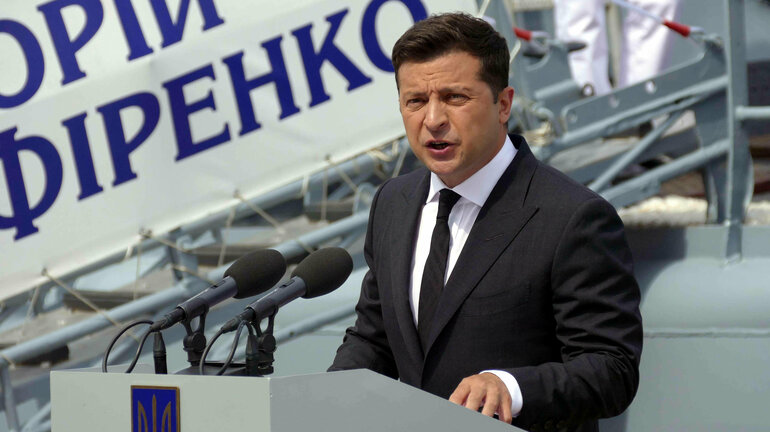Why Zelenskyi Is Downplaying the Threat of Escalation in Ukraine

Whether it is a tragic irony or a logical consequence of his strategy of appeasing Moscow, Volodymyr Zelenskyi, who overwhelmingly won Ukraine’s 2019 presidential election with a promise to restore peace to the country’s war-torn east, arguably faces the biggest threat of a Russian mass invasion since the conflict began in 2014. However, his recent public speeches stand in dramatic contrast to the general concern of imminent large-scale warfare.
A video address by Zelenskyi to the Ukrainian people on 19 January was structured around iterations of the phrase ‘It’s nothing new’. The president said, ‘And what, exactly, is the news here? Hasn’t this [situation] been the reality for eight years now? Didn’t the invasion start in 2014? Has the threat of war only just emerged? These risks have existed for many a day, and they have not increased. It is the hullabaloo around them that has grown.’ Zelenskyi restated this position at a briefing with foreign media in late January, when he admitted that the threat of war was high but no higher than last year.
This narrative fits poorly with Ukraine’s persistent requests for Western partners to impose preventive sanctions on Russia to curtail probable escalation on Ukraine’s eastern border. In an interview with the Washington Post, the president asked, ‘Why are you not introducing sanctions now rather than wait until after the escalation? I cannot see why the world should not be united regarding the introduction of sanctions. [...] And if this will be war, it’s going to be a very strong war, and everyone will lose.’
The political objectives of Zelenskyi’s populist rhetoric
These quotes reveal several objectives that Zelenskyi is attempting to pursue. First, on a superficial level, he is trying to soothe the Ukrainian population and curb any panic, which could be counterproductive in the face of an escalation. However, he is doing so in a patronising way: instead of rational discussions of developments on the ground and possible countermeasures, he is inviting people to retreat into their private lives and entrust him with solving the situation: ‘What should you do? Just one thing – keep calm’, and anticipate spring barbecues, summer vacations, weddings, and the football World Cup in autumn. Thus, Zelenskyi is not only conveying an optimistic message that people supposedly want to hear but also demobilising and depoliticising the population.
Second, the claim that the current situation is not news deflects accusations of poor policies and shifts the blame onto the president’s predecessor. Following the populist logic of externalising guilt, Zelenskyi finds an enemy in corrupt domestic and Western elites that supposedly benefit from the crisis: ‘If Russia has a common economic process with some European countries, for us Nord Stream 2 is a weapon against Ukraine. [...] I understand that the Russian Federation is a big market. [...] Everything is clear, the world is cynical, everything is about money. First money – then life.’ While the Kremlin is scandalously absent from the president’s rhetoric, the addressee of such moral pressure is not directly named either, but vaguely referred to as ‘the world’, ‘someone’, or ‘our partners’.
Third, Zelenskyi is tailoring three mutually conflicting messages to different elements of the foreign audience by simultaneously attempting to secure the support of Western officials, alarm a broader audience about the potential reverberations of Russian aggression, and reassure international investors to keep their assets in Ukraine. The third aim has recently come to the fore as the most urgent task: ‘And now they are actively attacking [...] the emotions of investors and the business conditions – to weaken Ukraine.’ Such juggling of several objectives is getting messy and might have unwanted effects by providing a basis for adversarial narratives.
The Kremlin factor and the failures of multiple signalling
The Kremlin remains a silent figure in Zelenskyi’s public rhetoric. The other side of the conflict in eastern Ukraine is rarely mentioned – and when it is, it is usually through indirect hints like ‘Everyone understands who occupied Crimea, everyone understands who is helping the separatists’. The dominant framing is of the war as a tragic ‘situation’, with a focus on consequences, not causes.
Ukraine’s president seems to be consistent in his intent to find a compromise, and he carefully avoids radical militant rhetoric to keep open the window of possibility. When cornered and directly asked if he considered Russian president Vladimir Putin a murderer, Zelenskyi pointed to the dangers of answering questions like that: ‘[…] people may die, an escalation may begin. You can now deprive (us – ed.) of at least a small chance to resolve the situation. That’s why I don't think you can ask such questions or answer them, even when you really want to.’
While presenting himself as a pragmatic leader with no ideological preferences, Zelenskyi points to the Ukrainian people as setting the limits of possible compromise: ‘To put in place a government that would be completely controlled by Russia would be impossible. Even if they do, this would be the shortest-lived government because people will simply not accept it.’ And, at the recent press briefing, he stated, ‘People are very much patriotically attuned; they see what has happened on the occupied territories, and they do not want that.’
To conclude, Zelenskyi’s public position is structured around several important cleavages: first, between his public claims and behind-closed-doors negotiations; second, between his own unideological stance and red lines drawn by the Ukrainian people; and third, between fighting for values and pursuing economic growth. The main problem, however, arises from failures in multiple signalling, when messages meant for different audiences get mixed up and generate undesired effects or are intentionally picked up by adversaries to campaign against the Ukrainian cause. The end point could be the loss of the consolidated international support that currently seems to be taken for granted.
Dr Valeria Korablyova is a senior research fellow at the Department of East European Studies of Charles University in Prague.